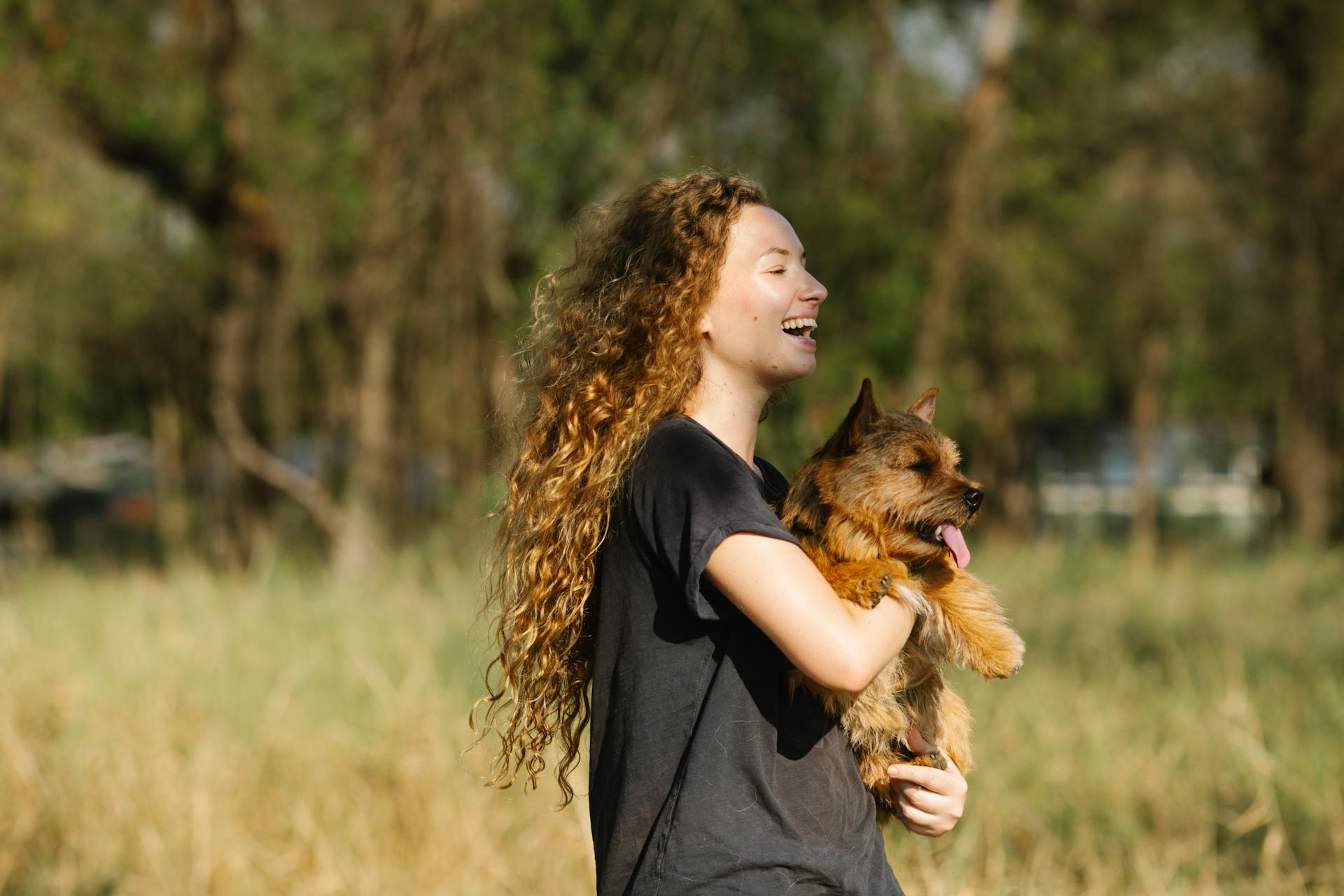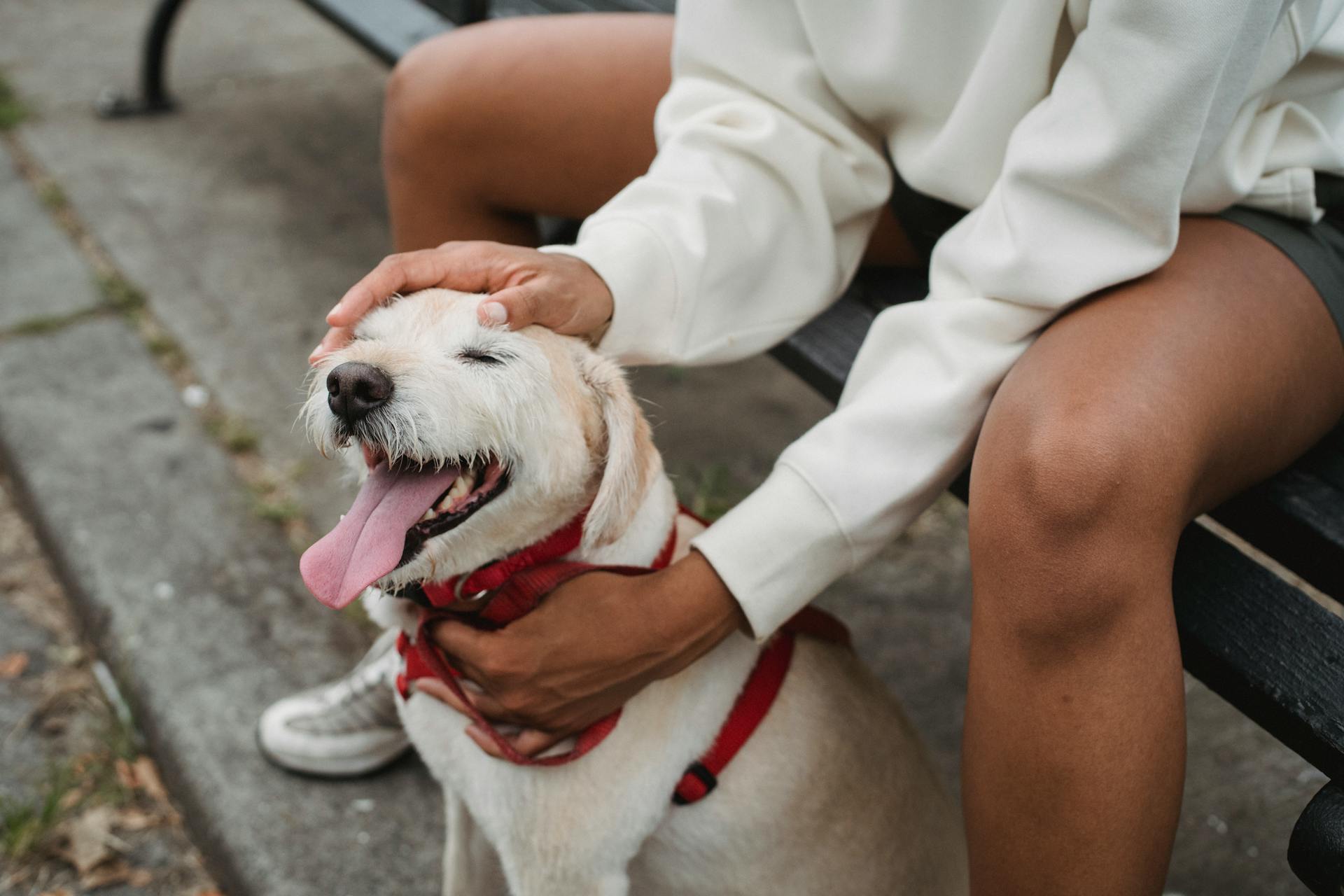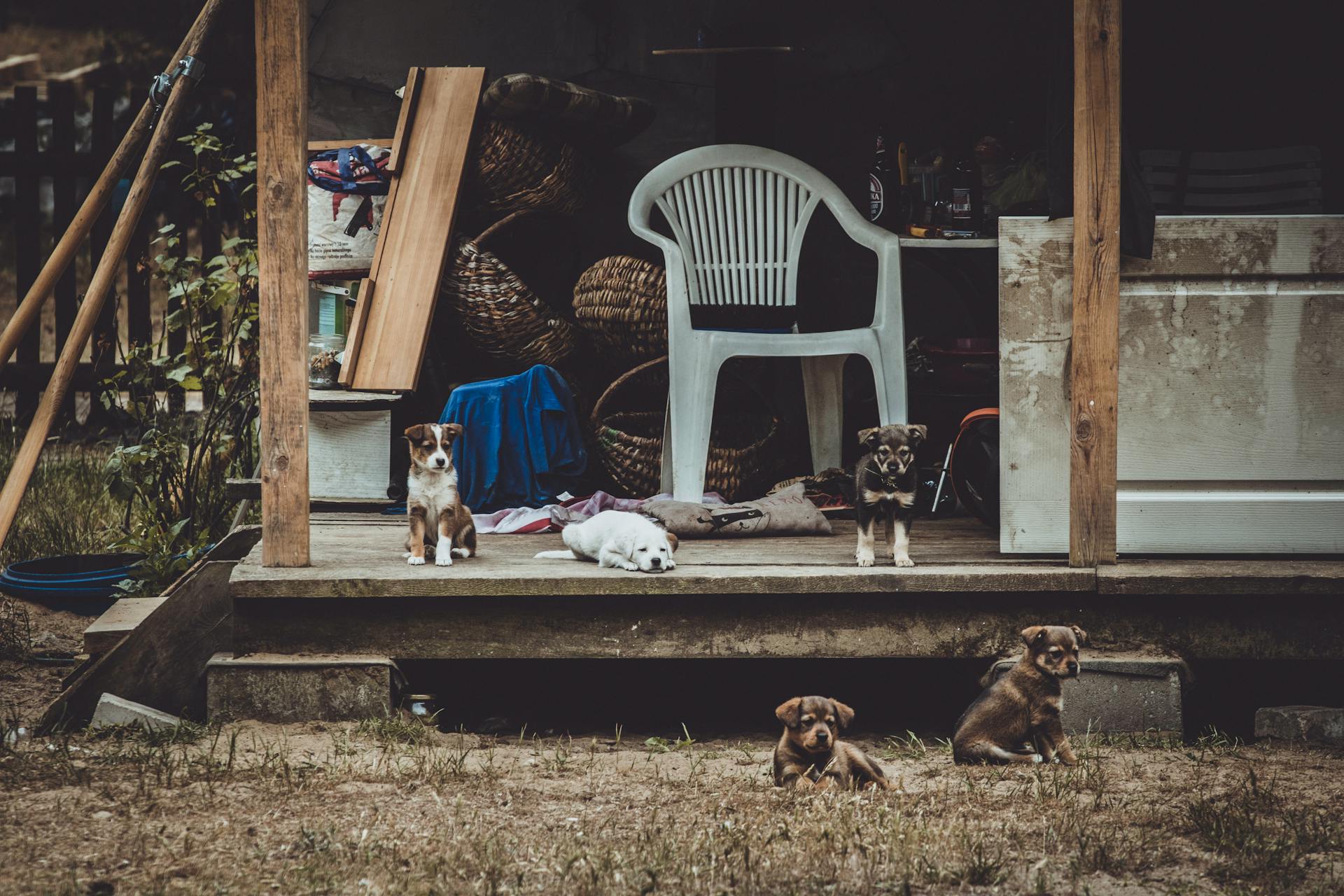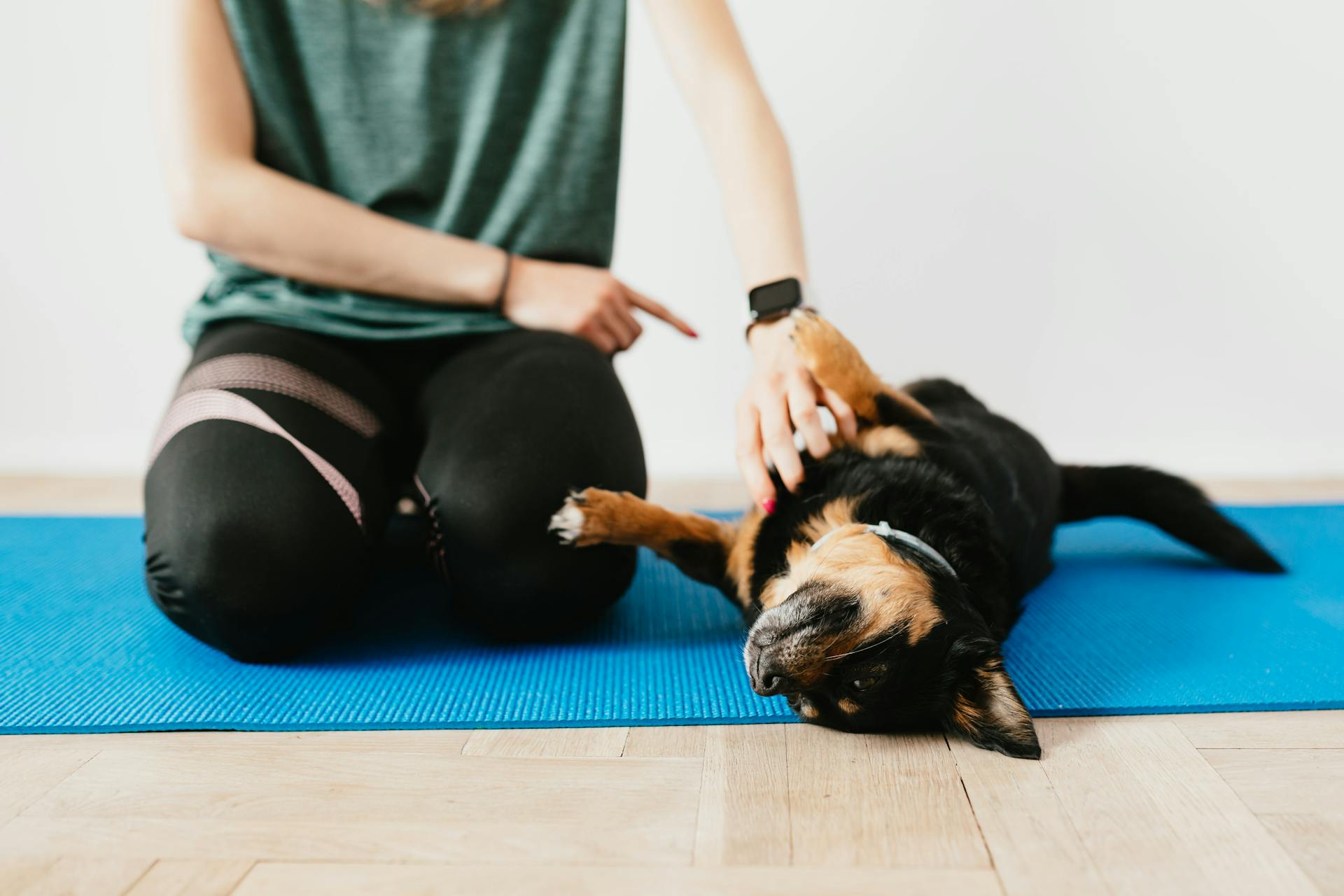
Training a Maltipoo requires patience, consistency, and positive reinforcement. They thrive on attention and affection, making them highly trainable.
Maltipoos are intelligent and curious dogs, which means they can pick up commands quickly. In fact, they are often described as " Velcro dogs" because of their strong attachment to their owners.
Housebreaking is a crucial part of training a Maltipoo, and establishing a routine is key. Take your Maltipoo outside to the same spot each time to create a consistent association.
With regular practice and positive reinforcement, your Maltipoo can learn to sit, stay, and come when called.
A different take: Maltipoo Breed Temperament
Establish a Routine
Establishing a routine is crucial for Maltipoo training. A daily routine helps your pup feel more confident and learn what to expect each day.
You should schedule in mealtimes, potty breaks, naps, exercise, playtime, and bonding time with you. This is especially important for potty training.
Dedicate certain times a day for commands and to encourage good behaviors. Consistency is key when training a Maltipoo.
Readers also liked: How Much Should a Maltipoo Eat a Day
Use the same words for commands, such as "sit", "stay", or "come", during all training sessions. This helps your Maltipoo understand what you want them to do.
Take your Maltipoo out first thing in the morning, after meals, and just before bedtime. This helps them understand that outside is the designated potty spot.
A regular routine for feeding, walking, and potty breaks will help your Maltipoo know when it's time to eat, exercise, or go potty.
Remember, each dog is different, so adjust your training to their personality and learning abilities.
Training Techniques
Positive reinforcement is a must for Maltipoo training, and it's a great way to build a strong bond with your pup.
Rewards are a key part of positive reinforcement, and they should be given immediately after the desired behavior. This creates a positive association and encourages your Maltipoo to keep doing the desired behaviors.
Use high-value treats during training to give your Maltipoo extra motivation. Short, frequent sessions are best to avoid overwhelming your pup.
Consistency is key when it comes to training. Use the same methods and rules consistently, making learning easier for your Maltipoo.
Here are five useful methods to make your training sessions successful:
- Rewards: Treats or pats when they do something right will encourage them to continue.
- Clicker Training: A clicker with a distinct noise marks the correct behavior.
- Verbal Cues: Specific words or phrases help them to know what to do.
- Patience: Training takes time and practice, so be patient and keep praising good behavior.
- Consistency: Use the same methods and rules consistently, making learning easier.
Clicker training is a form of positive reinforcement that pairs a clicking sound with a treat. It's an effective method for Maltipoos as it provides clear and immediate feedback for desired behaviors.
Start with simple commands and use the clicker followed by a treat when they successfully complete the command. As they progress, use the clicker to mark increasingly complex behaviors before rewarding them with a treat.
Housebreaking
Housebreaking is a crucial part of training a Maltipoo. You can use a crate to help with potty training, but be aware that your puppy can't be confined for long periods without accidents happening.
A good rule of thumb is to use your pup's age to determine how long you can leave them crated, e.g., if they are three months, they can likely manage three hours. Overnights should be okay.
A unique perspective: How Long Can a Maltipoo Be Left Alone
Buy a Crate
Buying a crate can be a great investment for housebreaking your Maltipoo. A crate serves as a safe space and an effective tool for potty training.
The crate should be large enough for your Maltipoo to stand, turn around, and lay down comfortably. This will give them enough room to move around and relax.
Crates can be another great addition to your potty training arsenal. As dogs view these as their sleeping area, they rarely soil them.
You can't expect to confine your puppy for long periods without accidents happening, so it's essential to set a rule of thumb for crate time. A good rule of thumb is to use your pup's age to determine how long you can leave them crated, e.g., if they are three months, they can likely manage three hours.
A crate might not be your best option if you're looking to keep your puppy in one safe space while you're out at work. In this case, consider using baby gates or a puppy playpen to set aside a room or part of one.
On a similar theme: Maltipoo Pom Puppies
Stick to the Same Spot
Choosing a specific spot for your puppy to do their business is crucial in housebreaking. This spot should be well away from seating spaces, children's play areas, vegetable gardens, and flower beds where potentially toxic chemicals may be used.
You'll want to pick a spot that your puppy can easily access, and that's somewhat protected from the elements. A sheltered spot can boost their confidence and keep them focused.
Keep in mind that once this habit is formed, it will be tough to break, so be sure to pick the place carefully. A spot behind a hedge or tree can provide your puppy with some much-needed privacy.
Check this out: Black Maltipoo Puppy
Behavioral Issues
Consistency is key when training a Maltipoo. Be consistent with training and set up clear boundaries to help your furry friend understand what's expected of them.
Training a Maltipoo shouldn't be that difficult, but they can still encounter issues along the way. Determining the cause of the problem is essential to addressing it effectively.
Maltipoos can be prone to behavioral issues such as barking, which can be due to boredom, anxiety, or attention-seeking. Training your Maltipoo puppies to bark on command and then be quiet can help reduce excessive barking.
- Use positive reinforcement, such as treats and praise, to encourage good behavior.
- Correct bad behavior calmly to avoid fear and aggression.
- Socialize your Maltipoo to different people, places, and situations to reduce anxiety.
Seeking professional help from a dog trainer or behaviorist can be beneficial if behavioral issues persist.
Common Issues
Maltipoos can struggle with behavioral issues, but the good news is that they can be tackled with the right approach. Consistency is key, so set clear boundaries and always reinforce good behavior.
Training a Maltipoo shouldn't be difficult, but some issues can arise. Be prepared to tackle common problems that come with the breed.
Maltipoos can be delightful, but they can also have behavioral issues. One of the most common problems is a lack of consistency in training. This can lead to confusion and bad behavior.
Consistency and positive reinforcement are key for success in addressing behavioral issues. Positive reinforcement involves offering treats, praise or playtime when your Maltipoo behaves well.
Check this out: Maltipoo Health Issues
Some Maltipoos may struggle with anxiety due to a lack of socialization. Exposing them to different people, places and situations can help them become more adaptable and reduce anxiety.
If your Maltipoo's behavioral issues persist, don't hesitate to seek professional help. A dog trainer or behaviorist who specializes in small breeds can provide valuable guidance and support.
Here are some common issues that Maltipoos may struggle with:
- Lack of consistency in training
- Anxiety due to lack of socialization
- Bad behavior due to yelling or physical punishment
Addressing Behavior Issues
Maltipoos, like any dog, can exhibit unwanted behaviors that need to be addressed through training. Consistency and positive reinforcement are key for success in addressing behavioral issues.
To tackle behavioral issues, it's essential to be consistent with training and set up clear boundaries. Always reinforce good behavior with treats, praise, or playtime. Correct bad behavior calmly, as yelling or physical punishment can lead to fear and aggression.
Maltipoos can be delightful, but they can also have behavioral issues. Socializing your Maltipoo is crucial, as exposing them to different people, places, and situations helps them become more adaptable and reduces anxiety.
Explore further: Maltipoo Behavior
Here are some common behavioral issues that Maltipoos struggle with and how to tackle them:
- Excessive barking due to boredom, anxiety, or attention-seeking can be managed by training your Maltipoo to bark on command and then be quiet.
- Chewing and digging can be redirected by providing plenty of toys and chew items, and using bitter apple spray on items they shouldn't chew.
- Separation anxiety can be addressed by gradually acclimating your Maltipoo puppy to your absence and creating a consistent routine for departures and arrivals.
- Leash issues, such as pulling or aggression, can be prevented by using a front-clip harness and seeking professional guidance from a trainer.
If your Maltipoo's behavioral issues persist, don't hesitate to seek professional help from a dog trainer or behaviorist who specializes in small breeds.
Biting & Mouthing
Dogs love to bite, chew, and mouth - it's just their nature.
In puppies, this behavior is often caused by the discomfort of teething, so providing them with plenty of puppy-safe chew toys can be a lifesaver.
Puppies will learn that biting hands or feet is acceptable if you let them continue this behavior, so it's essential to discourage it.
You can help your puppy develop healthy habits by giving them lots of chew toys to munch on.
Take a look at this: Adopt a Maltipoo Puppy
Clean Up Troubles Immediately
You've got to clean up any mess your puppy makes right away. This is crucial in preventing stains and odors from setting in.
Leaving a mess to sit can attract your puppy back to the same spot, making them repeat the behavior. Creatures of habit, remember?
Dogs have a far superior sense of smell than humans, so it's not enough to just remove the odor for us. The area needs to be completely odor-free for your hound.
Nature's Miracle Advanced Dog Enzymatic Stain Remover & Odor Eliminator is a great option for this job. It's specifically designed to tackle tough pet stains and odors.
Cleaning up quickly will also help prevent your puppy from being drawn back to the same spot by lingering smells.
Socializing Your
Socializing your Maltipoo is crucial for their development and behavior. Exposing them to people, animals, and different environments will make them confident and adjusted.
Start socializing your puppy from a young age, ideally between 7 weeks to 4 months, as this is the best time for them to be open to new things. Take them for walks in different neighborhoods, visit parks, and let them play with similar-sized dogs to teach them how to behave around others.
Introduce your Maltipoo to social situations gradually, starting with familiar places and widening their experiences. This will help them become confident in all sorts of situations, reducing the risk of anxiety and stress.
Enrolling your Maltipoo in obedience classes or training sessions is a great way to socialize them in a structured environment. This is where they can learn commands and manners while interacting with other pups.
Here are some ways to socialize your Maltipoo:
- Take your Maltipoo for walks in bustling areas to acclimate them to different environments.
- Invite friends and family over to meet and interact with your dog.
- Enroll in puppy socialization classes to expose your Maltipoo to controlled new experiences.
- Introduce your Maltipoo to other dogs in a safe and controlled setting to teach them proper social cues and behavior around other animals.
Remember to make the experience positive for your pup by rewarding them with treats or praise for good behavior. Avoid punishment and negative reinforcement, as this can create a bad association with social situations.
Leash Training
Leash training is a crucial aspect of training a Maltipoo. Most dogs, including Maltipoos, need to be taught how to walk calmly on a leash.
To start leash training, begin with a short, loose leash and encourage your Maltipoo to walk beside you with a treat in hand. If they start pulling, stop walking and wait until they return to your side before continuing.
Gradually increase the length of your walks and practice in different environments. This will help your Maltipoo become more comfortable and confident on a leash.
Walking on a Leash
Walking on a leash can be a challenge, but with patience and practice, you and your Maltipoo can master it. The key is to start with a short, loose leash and encourage them to walk beside you with a treat in hand.
To prevent leash pulling, it's essential to stop whenever your pup starts pulling on the leash. Wait for them to calm down and stop pulling, then reward them with praise and a tasty treat.
Here are some specific tips to help you walk on a leash with your Maltipoo:
- Start with a short, loose leash.
- Encourage them to walk beside you with a treat in hand.
- Gradually increase the length of your walks and practice in different environments.
If your Maltipoo pulls excessively, you can try using a front-clip harness that discourages pulling. However, if they exhibit leash aggression, it's best to address the behavior promptly with the guidance of a professional trainer.
Take Your Outside
Taking your Maltipoo outside is a crucial step in leash training. It's essential to introduce your puppy to their designated toileting spot in the yard right away.
This should be done as soon as you step through the door with your new puppy. Ask the breeder for a scrap of material with your puppy's scent on it to place in the allotted space.
Dogs are creatures of habit, so it's vital that you create a routine for your puppy's toilet breaks. Make a fuss over your fur baby as soon as they show interest in the designated spot.
Obedience and Tricks
Obedience training is a great way to solidify your Maltipoo's understanding of commands. Advanced obedience training can be a mentally engaging activity for your dog.
You can start with basic obedience training and move on to more advanced tricks and agility exercises. This will keep your Maltipoo's mind and body active, and give them a creative outlet for their energy.
Some fun tricks you can teach your Maltipoo include spinning in a circle for treats, and giving high-fives by touching your hand with their paw.
Mirror
Mirror training is a helpful method that sets an example for your pup and provides them with the tools and environment to thrive.
By sending your pup the right signals, you can help them succeed in training. This method is based on positive reinforcement and clicker training methods.
Consistency is key in mirror training, so make sure to stay consistent with training at all times.
Obedience
Obedience is a crucial part of any dog's training, and it's especially important for Maltipoos.
Advanced obedience training can be a mentally engaging activity for your Maltipoo, and it solidifies their understanding of commands.
Regular obedience training helps strengthen the bond between you and your Maltipoo, as it encourages clear communication and respect.
Obedience training can be done in short sessions, making it a great way to keep your Maltipoo's mind active and engaged throughout the day.
By practicing obedience commands, you can help your Maltipoo understand what's expected of them and develop good habits.
Tricks and Agility
Engage your Maltipoo's mind and body through trick training and basic agility exercises. This goes beyond obedience and gives them a creative outlet for their energy.
Trick training is a great way to mentally stimulate your Maltipoo. Teach your Maltipoo tricks such as spinning in a circle with a treat, and they'll love the challenge.
To teach your Maltipoo to spin, simply hold a treat above their head and move it in a circle. As they follow the treat with their nose, they'll naturally spin around.
You can also teach your Maltipoo to give you a high-five. Hold your hand up and say the command, and when they touch your hand with their paw, reward them with a treat.
Here are some fun tricks to get you started:
- “Spin”
- “High-five”
Remember to be patient and consistent when teaching your Maltipoo new tricks. With time and practice, they'll learn to love the challenge and have a blast doing it.
Tools and Resources
Having the right tools and resources can make a big difference in training your Maltipoo. Treat pouches are a great investment for easy access during training sessions.
You'll also want to have some interactive toys that dispense treats to keep your Maltipoo occupied and stimulated. These will come in handy during longer training sessions or when you need to keep your Maltipoo busy while you're away.
A comfortable harness or collar is also essential, suitable for your Maltipoo's size and breed.
Recommended Tools
When working with a Maltipoo, it's essential to have the right tools to make training sessions and everyday life easier.
Treat pouches are a must-have for easy access during training sessions. They allow you to reward your Maltipoo quickly and efficiently, which is especially helpful when they're in the middle of learning a new trick.
Interactive toys that dispense treats are a great way to keep your Maltipoo occupied and stimulated. These toys provide mental stimulation and can be a lifesaver on long car rides or when you're away from home.
A comfortable harness or collar is crucial for your Maltipoo's size and breed. This will ensure they feel secure and supported, which is essential for their physical and emotional well-being.
Some recommended tools for your Maltipoo include:
- Treat pouches
- Interactive toys that dispense treats
- Comfortable harnesses or collars
Get Certified Help
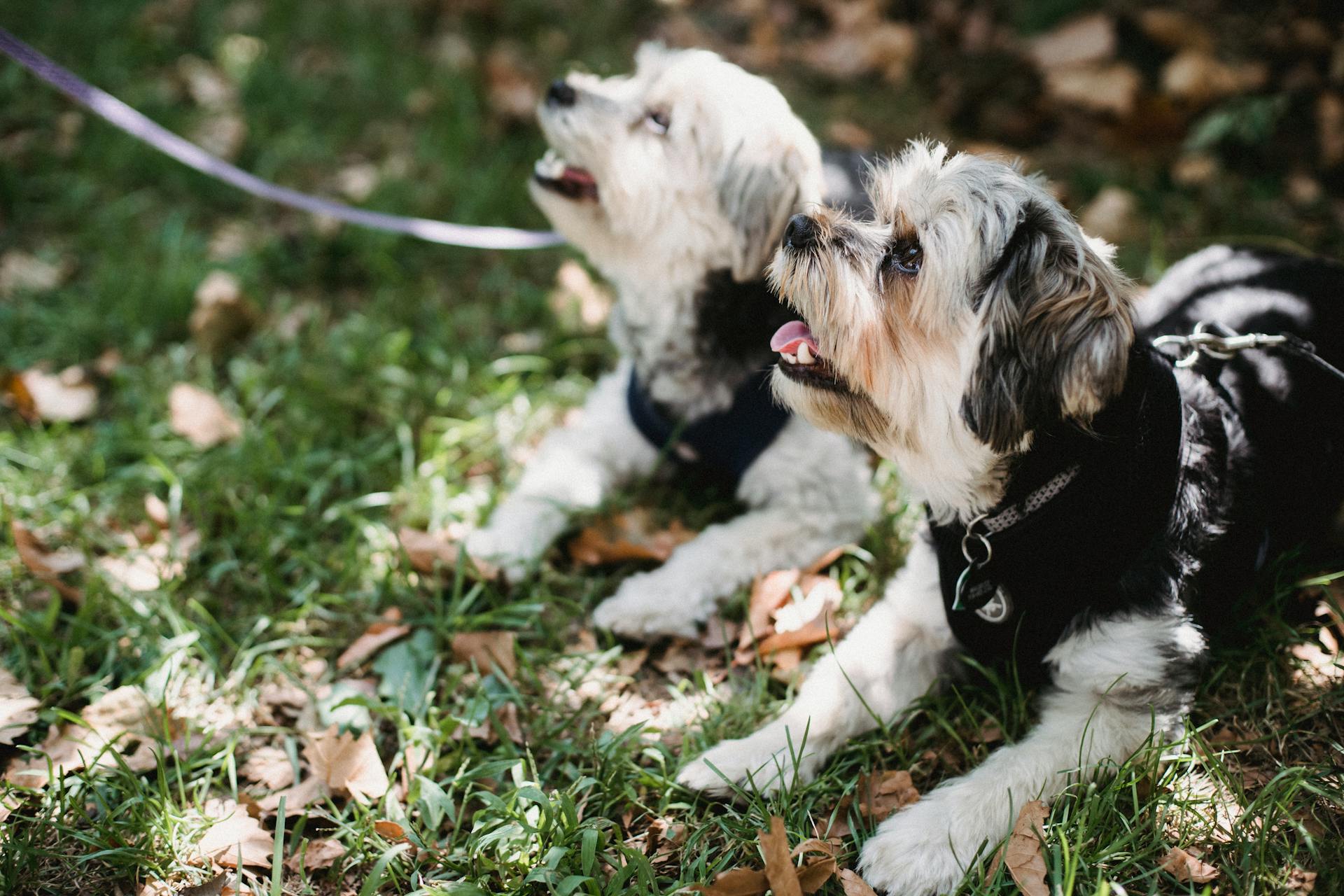
If you're feeling overwhelmed with potty training your puppy, consulting an expert is a great idea. You can find invaluable resources at Baxter and Bella's Online Puppy School, which offers packed courses with articles, podcasts, and more.
Local professional dog trainers can also be a huge help. They can work with you and your dog to create a feeding and toileting schedule.
A certified trainer can offer personalized advice on how to encourage your dog to go to the toilet in the right place. They can also provide guidance on the proper ways to approach house training.
You don't have to do it alone - there are many certified trainers available to help you and your dog.
Troubleshooting
Training a Maltipoo requires patience and consistency. Housebreaking can be challenging, but establishing a routine and using positive reinforcement techniques can help.
Identify the reasons behind your Maltipoo's accidents, such as lack of training or medical issues, to address the problem effectively. For example, if your Maltipoo is not yet fully housebroken, it's essential to reinforce good habits and prevent accidents.
Consistency is key when training a Maltipoo. By establishing a regular routine and sticking to it, you can help your Maltipoo feel secure and develop good habits.
Word of Caution

House training can be a lengthy process, often taking months to complete, so it's essential to be patient with your new puppy.
An 8 week old puppy is unlikely to be fully house trained when you bring them home, so don't expect them to pick up the habit right away.
This is especially true if they haven't been introduced to potty training before adoption, which can make the process even more challenging.
Remember, every puppy is different, and their learning pace may vary, but with consistent training and positive reinforcement, you can help them learn to go potty outside where they belong.
Frequently Asked Questions
Maltipoos can be very easy to train, thanks to their Poodle heritage and high levels of intelligence.
The key to successful training is to start as early as possible, preferably from the moment you bring your new pup home, and stay consistent throughout all of their life stages.
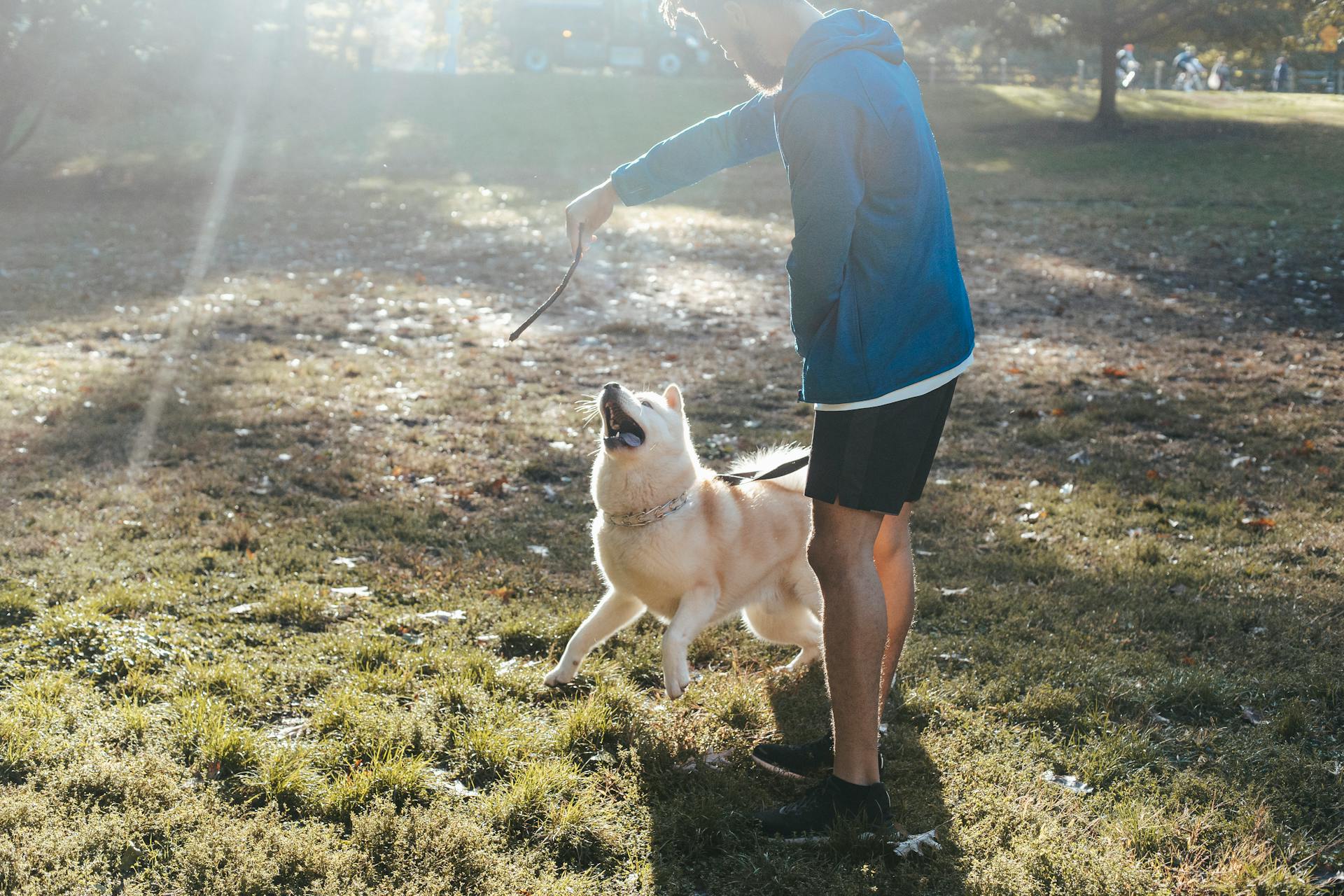
Discipline is essential, but it's not about scolding or punishing your puppy for not behaving correctly - it's about setting a positive example and staying consistent.
Positive reinforcement training methods, such as rewarding your puppy with praise, treats, or toys, are highly effective for Maltipoos.
The clicker training method can also be used, where the clicking noise hints at the impending treat or praise for completing a task successfully.
Maltipoos typically poop twice a day, but can go as many as five times in 24 hours, especially if they're young or eating frequently.
It's essential to remain consistent in your approach to potty training, especially when it comes to creating a routine for your puppy to follow.
Using something with your dog's scent on can help draw them back to the designated "bathroom space" and make potty training easier.
Frequently Asked Questions
How do you discipline a Maltipoo puppy?
For effective discipline, reward your Maltipoo puppy with special treats immediately after they perform the desired behavior, and be consistent in your training approach.
How do you train a Maltipoo to pee and poop outside?
To train a Maltipoo to pee and poop outside, use positive reinforcement by rewarding good behavior with praise, pets, or treats. Consistency is key, so reward promptly after each successful potty break.
How do you train a Maltipoo to come when called?
To train a Maltipoo to come when called, use a consistent command like "Roscoe" or your dog's name, and pair it with a treat or reward. Repetition and positive reinforcement will help your Maltipoo learn to respond quickly.
Featured Images: pexels.com
